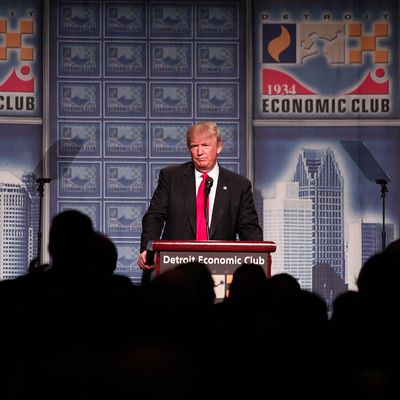
It is not really clear whether Trump has a “policy shop” in the traditional sense of the term. According to a very detailed account from the Washington Post’s Josh Rogin, the Trump campaign put together a policy team on the fly in Washington earlier this year, but then let it wither and die via malnourishment: Its work was not being used, and the campaign never got around to paying its members.
The real policy shop, says Rogin, is a threadbare operation working out of the Trump Tower under the direction of Stephen Miller, the talented but overextended speechwriter, warm-up speaker, conspiracy theorist, and all-around message-meister of Trump World.
And so, explains Politico’s Eli Stokols, Trump and his campaign have become adept at begging, borrowing, and stealing policy ideas from wherever they can find them.
When Donald Trump needed a list of potential Supreme Court nominees, he borrowed one from The Heritage Foundation. His proposals on reforming the nation’s tax code and improving services for veterans appear to have been lifted almost verbatim from those of primary rival Jeb Bush. And in 39 minutes of remarks Thursday, he lifted education proposals core to Mitt Romney’s 2012 platform and a plan that bears notable resemblance to a 2014 bill introduced by Sen. Lamar Alexander (R-Tenn.).
The speech, given in the cafeteria of a low-performing, for-profit Cleveland charter school run by a politically active donor named Ron Packard, is the latest example of Trump’s haphazard, cut-and-paste approach to policy — and his campaign’s eleventh-hour blitz of speeches, delivered via teleprompter, attempting to mask the candidate’s reluctance to invest in a real policy shop.
The improvisational nature of this operation and the shopworn nature of its policy products are to a considerable extent disguised by extremely low expectations. When an aggressively anti-intellectual candidate like Trump, who excels at playing to the racial and cultural resentments of white working-class voters and shocking the news media into saturation coverage, comes out with anything substantive — say, the hoary “school choice” proposals conservatives have been hawking for a couple of decades — it’s a revelation. It’s like a dog that can suddenly bark out “Jingle Bells.”
Watching this process unfold, you cannot help but wonder how a Trump agenda would be developed if he is elected president. Would he be like a poor man who is suddenly rich beyond all imagining, and thus become a “mark” for everyone in Washington who wants to peddle a policy idea? Would the overtly eccentric Miller, who seems most comfortable in the company of the twisted conspiracy buffs at Breitbart, but who also has a congressional background most Trump intimates lack, become the arbiter of all administration policy?
Old-timers may remember policy wonk John DiIulio’s charge that the Karl Rove–dominated policy apparatus of George W. Bush’s White House was the domain of “Mayberry Machiavellis” — people “who consistently talked and acted as if the height of political sophistication consisted in reducing every issue to its simplest, black-and-white terms for public consumption, then steering legislative initiatives or policy proposals as far right as possible.” Compared to what Trump might put together, the W. era of conservative policymaking could look like the age of Pericles.






























